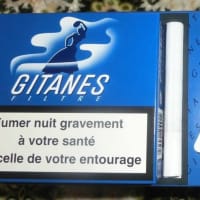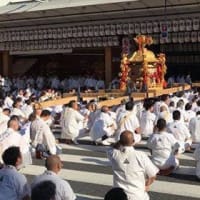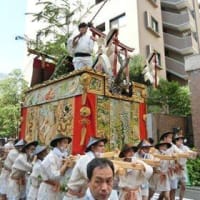河のテントはこわれた。指のような最後の葉っぱは
互いにからみあって濡れた土手に
沈み、風は音もなく鳶色の野原をすぎる。
あの妖女たちも去ってしまった。
美しいテムズよ、静かに流れよ
わが歌の尽くるまで。
もう河の上には浮いていない(*21)
あの空瓶(あきびん)もサンドウィッチの紙も
絹のハンカチもボール箱もシガレットの吸殻も
また夏の夜をしのぶ他の証拠品も。
あの乙女たちも去ってしまった。
またその男の友達の
商業区の重役の息子達ののらくらものの連中も去ってしまった。
宛名も置かずに。
われレーマン湖の水辺に坐り涙を流しぬ・・・・
美わしのテムズよ、静かに流れよ
わが歌の尽くるまで
美わしのテムズよ、静かに流れよ
われ声高くも長くも語らざれば。
だが僕のうしろで
寒い風につれて骸骨がすれ合う音や
耳から耳へとひろがってくすくす笑う声がする。
一匹の鼠が植物のしげみ
の中を通ってぬらぬらお腹をひきずって
土手の上を静かに這った。
わしはその時どんよりした運河で釣り
をしていた。冬の夕方であった。
ガスタンクのうしろへ廻って釣をしていた。
わしの難破した兄の王のことやそれ以前に
失くなった父の王のことを瞑想しながら(*22)。
裸の死骸が低い沼地の中で白くさらされたり、
小さい低い乾いた屋根裏に捨てられた
骨は毎年鼠の足でカラカラ鳴るばかりだ。
ところが今は僕のうしろの方で時々自動車(*23)や
角笛の警笛の音がきこえるが(*24)
これはスウィーニーという俗物を
泉に沐浴するポータの細君のところへつれ出すのだ。
おお月がポータの細君とその娘(*25)
の上に輝いた
ソーダ水の中で彼等は足を洗った。
おおそれから円天井の寺院で歌う少年唱歌隊の声だ(*26)
チョッ チョッ チョッ
ジャッグ ジャッグ ジャッグ ジャッグ ジャッグ ジャッグ
酷くも姿をかえられて。
テーレウー
空虚の都市
冬の正午、鳶色の霧の中で
スミルナの商人、不精ひげをはやした
ユーゲニデス氏は、ポケットに一杯
乾葡萄のロンドン渡し運賃保険料(*27)
込みの一覧払手形を所持していたが
俗悪のフランス語を使って
キアノン街ホテルのランチにそれからつづいて
週末はメトロポール・ホテルへ僕を誘い出した。
すみれ色の時刻
眼も背中も机から離れて上の方を向く、
人間の発動機は、待っているタクシイの
ようにゴトゴト動悸をうっている時に
わしはティーレシアス(*28)といって盲人であるが
男と女の二つの世界の間に生きて
いる萎(しなび)れた女の乳房のある老人だ。
このすみれ色の時刻
人々が家路を競う時
水夫が海からもどる時には眼が見えるのだ(*29)。
お茶時に帰ったタイピストは朝飯を
かたづける、ストーブに火をつけ
罐詰の食糧をひろげる。
窓の外へあやうくひろげた
コムビネーションのパンツは
夕陽の最後の光に触れている。
長椅子(夜は彼女のベッド)の上には
靴下やスリッパ、ジャケツ、コルセットが
堆積している。
萎(しなび)れた乳房の老人ティーレシアスなる
わしにはそうした情景が見えたのだ、
それから後(あと)のことも皆予言出来たのだ--。
あのニキビのある赤ら顔の青年
の彼氏がやって来るのだ。
彼は家屋周旋屋の勤人、小柄な奴で無作法に
人を見つめる癖がある
ブラッドフォドの戦争成金が被る
シルクハットのように図々しく見える
生意気な下等な連中の一人だ。
食後女はものうく退屈になった。
女を愛撫に引込もうと努力する。
いやだと思っても、まだ
たしなめもしないでいる。
顔を赤らめ決心して、すぐ襲う
探る手は如何なる防備にも遭遇せず。
彼の己惚は何等の呼応を必要とせず
無関心を恣に悪用するのだ。
(わし、ティーレシアスはこの長椅子
或はベッドで行われるすべての事は
予め許しておいたのだ。
テーベ市は城壁の下に坐っていたり
死のどん底を歩いたことがあるわしだ。)
旦那気取りの別れの接吻を与えて
手さぐりで帰るのだ、階段には明りがなかった・・・・
女はふり返って鏡をちょっと見る
愛人の過去を殆ど気づかないで。
一つの淡い考えがうっかり女の頭に浮かんだ--
『やれ、やれ、まあまあこれで済んでよかったわ』
美しい女が馬鹿なまねに身をおとしてから(*30)
一人で室の中を歩きまわる場合は
自動的に手で髪を撫でつけ
蓄音機にレコードをかけるのだ。
『この言葉は波にのり我が傍(かたわら)を這い(*31)』
ストランド街からヴィクトリア女王街
を上がって漂い去った。
オー・ロンドンの商業街、下(しも)テムズ街の
居酒屋のわきで美しい哀れなマンドリンの
泣く声がきこえる、また昼時(ひるどき)には漁夫の
たまり場から騒々しい笑声と雑談が
きこえる。そこではマグヌス・マーター寺(*32)
の壁が壮麗なイーオニャ式の純白と
黄金の言い難い美を保存している。
河は油とタール(*33)
の汗を流す
荷舟は変わる潮につれて
漂う
ヨットの赤い帆は
よく開いて
風下へ向かって重い橋の上で揺れる
荷舟はアイル・オブ・ドッグズ区を通り
グリニッジ岬を通って
漂う丸太を流す
ウェンヤラホイ
ウェンヤラホイ
エリザベス女王とレスター伯(*34)
波をうつ橈(かい)の音
艫に御座所があった
金ぱくの貝形船
紅に黄金
泡立つうねりは
両岸に小波をうちよせた
西南風は
鐘の響きを
下流に運んだ
あれ白い塔がみえる
ウェンヤラホイ
ウェンヤラホイ
「電車、ほこりの木々。
ハイブリはあたしを生んだ。
リッチモンドとキューはあたしを亡した(*35)。
リッチモンドのほとりであたしは
細長い丸木舟の床に仰むけに
なり膝を立ててよこたわった」
「あたしの足はムアゲートに、
あたしの心は自分の足でふみにじる。
事のあと
彼は泣いて『新しい発足』を約束した。
あたしは何も言わなかった。
何も怨みません。」
「マーゲートの海浜で。
何が何やら思い出せない。
汚れた手の裂かれた爪。
家(うち)の人達は何の望もない賤しい人達。」
ララ
それから我れカルタゴに来たれり(*36)
燃える燃える燃える燃えている(*37)
おお天主よあなたは私を救い出されます(*38)
おお天主よあなたは救い出されます
燃えてる
【原註】
(*21) スペンサの『結婚歌』
(*22) シェイクスピアの『テムペスト』1ノ2場
(*23) マーヴェルの『はにかむ女へ』参照
(*24) デイの『蜂の会議』「みみかたむけていると、急に角笛を吹き猟りする音がアクテーオンを泉に浴すダイアーナへさそい出し、そこでは皆は裸の女神を見る時分に」
(*25) これ等の諸行を取って来た俗謡の原本は知らないが、オーストラリアのシドニーから報知を受けたのだ。
(*26) ヴェルレーヌの『パルシファル』
(*27) 乾葡萄はロンドンまで運賃と保険なしで相場が附けられていた。それから船荷証券などは一覧払の手形の支払の時に買手に手渡されることになった。
(*28) ティーレシアスは実は、詩中の登場人物ではなく単に傍観者として出しているのであるが、最も重要な役割をつとめているというのは、他の人物をも結合してもたせているのだ。丁度あの乾葡萄売りの一つ眼の商人がフィニキア人の水夫の中へも解け込んでいるし、またその水夫はナポリの公爵のファーディナンドとも完全に区別が出来なくさせているように、ここに出てくる女は皆一人の女に総合させて考えることも出来、またティーレシアスの中に男女の両性を合致させている。実はティーレシアスの観察することはすべて、この詩全体の主要部分ともなるのだ。オヴィッドからの引用全文は原始文化研究として非常に興味あるものだ。「話によると、或る時、ジョーヴの神は酒に酔って、朗らかな気持になって、つれづれのままに、ジューノーの女神に冗談を云いかけた。『房事に関してはあなた方女の快楽の方が男が感じる快楽よりも大きいと思う』。しかし女神は正反対の意見であった。それでその判断は賢明なティーレシアスにやってもらうことにした。彼は房事については両方の側のことを知っていた。かつて、彼はみどりの森で交合している二匹の大きな蛇を棒でなぐりつけた。そうすると、驚くべきことには、ティーレシアスは男から女になってしまった。その後7年間女として暮らした。8年目に彼はまた同じ蛇を見た時に言った。『お前たちをなぐったことは、なぐった人の性を変えてしまうという魔力を持っているのだから、わしは、もう一度お前をなぐって見よう』と云いながら、蛇をなぐりつけたところが、また生まれた時の性と同じ男にもどった。そこでティーレシアスはその神々の冗談の論争を裁くことを依頼された時はジョーヴの神の方へ味方した。そうすると、女神はことの如何にもかかわらず、意外にも怒って、その裁判者を一生めくらにしてしまった。けれども神がなしたことを他の神がこれを取り消すことができないので、全知全能のジェーヴの神はティーレシアスの失明を気の毒に思って、その代わりに未来を予言する力を与えた。そうした名誉によってその刑罰を軽減したのであった。
(*29) この行はサップホーの詩として正確に出したのではなく、日暮れに帰る近海漁夫または平底軽舟による漁夫を考えていたのだ。
(*30) ゴウルドスミスの『ウェイクフィールドの牧師』の中の歌
(*31) 『テムペスト』以上と同じ
(*32) 聖マグヌス・マータ寺の内部は自分の考えでは、レンの建造になる寺院の内部で最も美しいものの一つである。『都内19箇所の教会の取り毀しに関する建言書』 (ピー・エス・キング社出版)参照
(*33) 三人のテムズ河娘の歌はここから始まる。(434頁上段8行)から(434頁下段2行)まで彼等は交代に話す。『神神の薄明』の第三部の「ライン河の娘」参照
(*34) フルードの『エリザベス』の第1巻4章中にある「スペインのフィリップに寄せたデ・カードラの手紙」参照。「午後私たちは屋形船に乗って水上の競技を見物していた。女王はひとりロバート卿と私自身と一緒に船尾におられた。その時雑談が始まった。ロバ-トは遂に口をすべらせて、私のいるところで、『女王がお召しなら結婚しても差支えない』と言った」
(*35) 『神曲、煉獄篇』5ノ133
「ラ・ピーアであるわたしのことを思い出してくれ。シエナはわたしを産み、マレンマは私を殺した」
(*36) 聖オーガスティンの『信仰告白』の中の「私はそれからカルタゴへ来た、そこで私は耳のところで不浄な色欲の大鍋がやかましく煮え立っていた」
(*37) 仏陀の『火の説教』(これはキリスト教の山上の訓戒に当たる重大なものである)からこれ等の言葉を取って来た。その完全なテクストは故ヘンリ・クラ-ク・ウォレンの『仏教翻訳』(ハーヴァード東洋叢書)に出ている。ウォレン氏は西洋に於ける仏教研究の偉大な先駆者の一人であった。
(*38) 聖オーガスティンの『信仰告白』からまた取ったもの。東洋と西洋の禁欲主義の二つの代表的なものを並べてみたのであったが、これはこの詩のこの部分の終極の目的を表現するためにしたことで、決して偶然に並べたのではない。
□T・S・エリオット(西脇順三郎・訳)『荒地』(『世界文学全集48 世界近代詩人十人集』所収、新潮社、1963)
↓クリック、プリーズ。↓



【参考】
「【T・S・エリオット】荒地 ~2 将棋~」
「【T・S・エリオット】「荒地」 ~1 埋葬~」
*
III. THE FIRE SERMON
The river's tent is broken: the last fingers of leaf
Clutch and sink into the wet bank. The wind
Crosses the brown land, unheard. The nymphs are departed.
Sweet Thames, run softly, till I end my song.
The river bears no empty bottles, sandwich papers,
Silk handkerchiefs, cardboard boxes, cigarette ends
Or other testimony of summer nights. The nymphs are departed.
And their friends, the loitering heirs of city directors; 180
Departed, have left no addresses.
Line 161 ALRIGHT. This spelling occurs also in
the Hogarth Press edition? Editor.
By the waters of Leman I sat down and wept . . .
Sweet Thames, run softly till I end my song,
Sweet Thames, run softly, for I speak not loud or long.
But at my back in a cold blast I hear
The rattle of the bones, and chuckle spread from ear to ear.
A rat crept softly through the vegetation
Dragging its slimy belly on the bank
While I was fishing in the dull canal
On a winter evening round behind the gashouse 190
Musing upon the king my brother's wreck
And on the king my father's death before him.
White bodies naked on the low damp ground
And bones cast in a little low dry garret,
Rattled by the rat's foot only, year to year.
But at my back from time to time I hear
The sound of horns and motors, which shall bring
Sweeney to Mrs. Porter in the spring.
O the moon shone bright on Mrs. Porter
And on her daughter 200
They wash their feet in soda water
Et O ces voix d'enfants, chantant dans la coupole!
Twit twit twit
Jug jug jug jug jug jug
So rudely forc'd.
Tereu
Unreal City
Under the brown fog of a winter noon
Mr. Eugenides, the Smyrna merchant
Unshaven, with a pocket full of currants 210
C.i.f. London: documents at sight,
Asked me in demotic French
To luncheon at the Cannon Street Hotel
Followed by a weekend at the Metropole.
At the violet hour, when the eyes and back
Turn upward from the desk, when the human engine waits
Like a taxi throbbing waiting,
I Tiresias, though blind, throbbing between two lives,
Old man with wrinkled female breasts, can see
At the violet hour, the evening hour that strives 220
Homeward, and brings the sailor home from sea,
The typist home at teatime, clears her breakfast, lights
Her stove, and lays out food in tins.
Out of the window perilously spread
Her drying combinations touched by the sun's last rays,
On the divan are piled (at night her bed)
Stockings, slippers, camisoles, and stays.
I Tiresias, old man with wrinkled dugs
Perceived the scene, and foretold the rest?
I too awaited the expected guest. 230
He, the young man carbuncular, arrives,
A small house agent's clerk, with one bold stare,
One of the low on whom assurance sits
As a silk hat on a Bradford millionaire.
The time is now propitious, as he guesses,
The meal is ended, she is bored and tired,
Endeavours to engage her in caresses
Which still are unreproved, if undesired.
Flushed and decided, he assaults at once;
Exploring hands encounter no defence; 240
His vanity requires no response,
And makes a welcome of indifference.
(And I Tiresias have foresuffered all
Enacted on this same divan or bed;
I who have sat by Thebes below the wall
And walked among the lowest of the dead.)
Bestows one final patronising kiss,
And gropes his way, finding the stairs unlit . . .
She turns and looks a moment in the glass,
Hardly aware of her departed lover; 250
Her brain allows one half-formed thought to pass:
"Well now that's done: and I'm glad it's over."
When lovely woman stoops to folly and
Paces about her room again, alone,
She smoothes her hair with automatic hand,
And puts a record on the gramophone.
"This music crept by me upon the waters"
And along the Strand, up Queen Victoria Street.
O City city, I can sometimes hear
Beside a public bar in Lower Thames Street, 260
The pleasant whining of a mandoline
And a clatter and a chatter from within
Where fishmen lounge at noon: where the walls
Of Magnus Martyr hold
Inexplicable splendour of Ionian white and gold.
The river sweats
Oil and tar
The barges drift
With the turning tide
Red sails 270
Wide
To leeward, swing on the heavy spar.
The barges wash
Drifting logs
Down Greenwich reach
Past the Isle of Dogs.
Weialala leia
Wallala leialala
Elizabeth and Leicester
Beating oars 280
The stern was formed
A gilded shell
Red and gold
The brisk swell
Rippled both shores
Southwest wind
Carried down stream
The peal of bells
White towers
Weialala leia 290
Wallala leialala
"Trams and dusty trees.
Highbury bore me. Richmond and Kew
Undid me. By Richmond I raised my knees
Supine on the floor of a narrow canoe."
"My feet are at Moorgate, and my heart
Under my feet. After the event
He wept. He promised 'a new start'.
I made no comment. What should I resent?"
"On Margate Sands. 300
I can connect
Nothing with nothing.
The broken fingernails of dirty hands.
My people humble people who expect
Nothing."
la la
To Carthage then I came
Burning burning burning burning
O Lord Thou pluckest me out
O Lord Thou pluckest 310
burning
NOTES ON "THE WASTE LAND"
III. THE FIRE SERMON
176. V. Spenser, Prothalamion.
192. Cf. The Tempest, I. ii.
196. Cf. Marvell, To His Coy Mistress.
197. Cf. Day, Parliament of Bees:
"When of the sudden, listening, you shall hear,
"A noise of horns and hunting, which shall bring
"Actaeon to Diana in the spring,
"Where all shall see her naked skin . . ."
199. I do not know the origin of the ballad from which these lines
are taken: it was reported to me from Sydney, Australia.
202. V. Verlaine, Parsifal.
210. The currants were quoted at a price "carriage and insurance
free to London"; and the Bill of Lading etc. were to be handed
to the buyer upon payment of the sight draft.
Notes 196 and 197 were transposed in this and the Hogarth Press edition,
but have been corrected here.
210. "Carriage and insurance free"] "cost, insurance and freight"-Editor.
218. Tiresias, although a mere spectator and not indeed a "character,"is yet the most important personage in the poem, uniting all the rest. Just as the one-eyed merchant, seller of currants, melts into the Phoenician Sailor, and the latter is not wholly distinct from Ferdinand Prince of Naples, so all the women are one woman,
and the two sexes meet in Tiresias. What Tiresias sees, in fact, is the substance of the poem. The whole passage from Ovid is of great anthropological interest:
'. . . Cum Iunone iocos et maior vestra profecto est
Quam, quae contingit maribus,' dixisse, 'voluptas.'
Illa negat; placuit quae sit sententia docti
Quaerere Tiresiae: venus huic erat utraque nota.
Nam duo magnorum viridi coeuntia silva
Corpora serpentum baculi violaverat ictu
Deque viro factus, mirabile, femina septem
Egerat autumnos; octavo rursus eosdem
Vidit et 'est vestrae si tanta potentia plagae,'
Dixit 'ut auctoris sortem in contraria mutet,
Nunc quoque vos feriam!' percussis anguibus isdem
Forma prior rediit genetivaque venit imago.
Arbiter hic igitur sumptus de lite iocosa
Dicta Iovis firmat; gravius Saturnia iusto
Nec pro materia fertur doluisse suique
Iudicis aeterna damnavit lumina nocte,
At pater omnipotens (neque enim licet inrita cuiquam
Facta dei fecisse deo) pro lumine adempto
Scire futura dedit poenamque levavit honore.
221. This may not appear as exact as Sappho's lines, but I had in mind
the "longshore" or "dory" fisherman, who returns at nightfall.
253. V. Goldsmith, the song in The Vicar of Wakefield.
257. V. The Tempest, as above.
264. The interior of St. Magnus Martyr is to my mind one of the finest among Wren's interiors. See The Proposed Demolition of Nineteen City Churches (P. S. King & Son, Ltd.) .
266. The Song of the (three) Thames-daughters begins here.
From line 292 to 306 inclusive they speak in turn.
V. Gutterdsammerung, III. i: the Rhine-daughters.
279. V. Froude, Elizabeth, Vol. I, ch. iv, letter of De Quadra
to Philip of Spain:
"In the afternoon we were in a barge, watching the games on the river.
(The queen) was alone with Lord Robert and myself on the poop,
when they began to talk nonsense, and went so far that Lord Robert
at last said, as I was on the spot there was no reason why they
should not be married if the queen pleased."
293. Cf. Purgatorio, v. 133:
"Ricorditi di me, che son la Pia;
Siena mi fe', disfecemi Maremma."
307. V. St. Augustine's Confessions: "to Carthage then I came,
where a cauldron of unholy loves sang all about mine ears."
308. The complete text of the Buddha's Fire Sermon (which corresponds in importance to the Sermon on the Mount) from which these words are taken, will be found translated in the late Henry Clarke Warren's Buddhism
in Translation (Harvard Oriental Series) . Mr. Warren was one of the great pioneers of Buddhist studies in the Occident.
309. From St. Augustine's Confessions again. The collocation of these two representatives of eastern and western asceticism, as the culmination of this part of the poem, is not an accident.
□T.S. Eliot (1888-1965) “The Waste Land” 1922
↓クリック、プリーズ。↓



【参考】
「【T・S・エリオット】荒地 ~2 将棋~」
「【T・S・エリオット】「荒地」 ~1 埋葬~」
互いにからみあって濡れた土手に
沈み、風は音もなく鳶色の野原をすぎる。
あの妖女たちも去ってしまった。
美しいテムズよ、静かに流れよ
わが歌の尽くるまで。
もう河の上には浮いていない(*21)
あの空瓶(あきびん)もサンドウィッチの紙も
絹のハンカチもボール箱もシガレットの吸殻も
また夏の夜をしのぶ他の証拠品も。
あの乙女たちも去ってしまった。
またその男の友達の
商業区の重役の息子達ののらくらものの連中も去ってしまった。
宛名も置かずに。
われレーマン湖の水辺に坐り涙を流しぬ・・・・
美わしのテムズよ、静かに流れよ
わが歌の尽くるまで
美わしのテムズよ、静かに流れよ
われ声高くも長くも語らざれば。
だが僕のうしろで
寒い風につれて骸骨がすれ合う音や
耳から耳へとひろがってくすくす笑う声がする。
一匹の鼠が植物のしげみ
の中を通ってぬらぬらお腹をひきずって
土手の上を静かに這った。
わしはその時どんよりした運河で釣り
をしていた。冬の夕方であった。
ガスタンクのうしろへ廻って釣をしていた。
わしの難破した兄の王のことやそれ以前に
失くなった父の王のことを瞑想しながら(*22)。
裸の死骸が低い沼地の中で白くさらされたり、
小さい低い乾いた屋根裏に捨てられた
骨は毎年鼠の足でカラカラ鳴るばかりだ。
ところが今は僕のうしろの方で時々自動車(*23)や
角笛の警笛の音がきこえるが(*24)
これはスウィーニーという俗物を
泉に沐浴するポータの細君のところへつれ出すのだ。
おお月がポータの細君とその娘(*25)
の上に輝いた
ソーダ水の中で彼等は足を洗った。
おおそれから円天井の寺院で歌う少年唱歌隊の声だ(*26)
チョッ チョッ チョッ
ジャッグ ジャッグ ジャッグ ジャッグ ジャッグ ジャッグ
酷くも姿をかえられて。
テーレウー
空虚の都市
冬の正午、鳶色の霧の中で
スミルナの商人、不精ひげをはやした
ユーゲニデス氏は、ポケットに一杯
乾葡萄のロンドン渡し運賃保険料(*27)
込みの一覧払手形を所持していたが
俗悪のフランス語を使って
キアノン街ホテルのランチにそれからつづいて
週末はメトロポール・ホテルへ僕を誘い出した。
すみれ色の時刻
眼も背中も机から離れて上の方を向く、
人間の発動機は、待っているタクシイの
ようにゴトゴト動悸をうっている時に
わしはティーレシアス(*28)といって盲人であるが
男と女の二つの世界の間に生きて
いる萎(しなび)れた女の乳房のある老人だ。
このすみれ色の時刻
人々が家路を競う時
水夫が海からもどる時には眼が見えるのだ(*29)。
お茶時に帰ったタイピストは朝飯を
かたづける、ストーブに火をつけ
罐詰の食糧をひろげる。
窓の外へあやうくひろげた
コムビネーションのパンツは
夕陽の最後の光に触れている。
長椅子(夜は彼女のベッド)の上には
靴下やスリッパ、ジャケツ、コルセットが
堆積している。
萎(しなび)れた乳房の老人ティーレシアスなる
わしにはそうした情景が見えたのだ、
それから後(あと)のことも皆予言出来たのだ--。
あのニキビのある赤ら顔の青年
の彼氏がやって来るのだ。
彼は家屋周旋屋の勤人、小柄な奴で無作法に
人を見つめる癖がある
ブラッドフォドの戦争成金が被る
シルクハットのように図々しく見える
生意気な下等な連中の一人だ。
食後女はものうく退屈になった。
女を愛撫に引込もうと努力する。
いやだと思っても、まだ
たしなめもしないでいる。
顔を赤らめ決心して、すぐ襲う
探る手は如何なる防備にも遭遇せず。
彼の己惚は何等の呼応を必要とせず
無関心を恣に悪用するのだ。
(わし、ティーレシアスはこの長椅子
或はベッドで行われるすべての事は
予め許しておいたのだ。
テーベ市は城壁の下に坐っていたり
死のどん底を歩いたことがあるわしだ。)
旦那気取りの別れの接吻を与えて
手さぐりで帰るのだ、階段には明りがなかった・・・・
女はふり返って鏡をちょっと見る
愛人の過去を殆ど気づかないで。
一つの淡い考えがうっかり女の頭に浮かんだ--
『やれ、やれ、まあまあこれで済んでよかったわ』
美しい女が馬鹿なまねに身をおとしてから(*30)
一人で室の中を歩きまわる場合は
自動的に手で髪を撫でつけ
蓄音機にレコードをかけるのだ。
『この言葉は波にのり我が傍(かたわら)を這い(*31)』
ストランド街からヴィクトリア女王街
を上がって漂い去った。
オー・ロンドンの商業街、下(しも)テムズ街の
居酒屋のわきで美しい哀れなマンドリンの
泣く声がきこえる、また昼時(ひるどき)には漁夫の
たまり場から騒々しい笑声と雑談が
きこえる。そこではマグヌス・マーター寺(*32)
の壁が壮麗なイーオニャ式の純白と
黄金の言い難い美を保存している。
河は油とタール(*33)
の汗を流す
荷舟は変わる潮につれて
漂う
ヨットの赤い帆は
よく開いて
風下へ向かって重い橋の上で揺れる
荷舟はアイル・オブ・ドッグズ区を通り
グリニッジ岬を通って
漂う丸太を流す
ウェンヤラホイ
ウェンヤラホイ
エリザベス女王とレスター伯(*34)
波をうつ橈(かい)の音
艫に御座所があった
金ぱくの貝形船
紅に黄金
泡立つうねりは
両岸に小波をうちよせた
西南風は
鐘の響きを
下流に運んだ
あれ白い塔がみえる
ウェンヤラホイ
ウェンヤラホイ
「電車、ほこりの木々。
ハイブリはあたしを生んだ。
リッチモンドとキューはあたしを亡した(*35)。
リッチモンドのほとりであたしは
細長い丸木舟の床に仰むけに
なり膝を立ててよこたわった」
「あたしの足はムアゲートに、
あたしの心は自分の足でふみにじる。
事のあと
彼は泣いて『新しい発足』を約束した。
あたしは何も言わなかった。
何も怨みません。」
「マーゲートの海浜で。
何が何やら思い出せない。
汚れた手の裂かれた爪。
家(うち)の人達は何の望もない賤しい人達。」
ララ
それから我れカルタゴに来たれり(*36)
燃える燃える燃える燃えている(*37)
おお天主よあなたは私を救い出されます(*38)
おお天主よあなたは救い出されます
燃えてる
【原註】
(*21) スペンサの『結婚歌』
(*22) シェイクスピアの『テムペスト』1ノ2場
(*23) マーヴェルの『はにかむ女へ』参照
(*24) デイの『蜂の会議』「みみかたむけていると、急に角笛を吹き猟りする音がアクテーオンを泉に浴すダイアーナへさそい出し、そこでは皆は裸の女神を見る時分に」
(*25) これ等の諸行を取って来た俗謡の原本は知らないが、オーストラリアのシドニーから報知を受けたのだ。
(*26) ヴェルレーヌの『パルシファル』
(*27) 乾葡萄はロンドンまで運賃と保険なしで相場が附けられていた。それから船荷証券などは一覧払の手形の支払の時に買手に手渡されることになった。
(*28) ティーレシアスは実は、詩中の登場人物ではなく単に傍観者として出しているのであるが、最も重要な役割をつとめているというのは、他の人物をも結合してもたせているのだ。丁度あの乾葡萄売りの一つ眼の商人がフィニキア人の水夫の中へも解け込んでいるし、またその水夫はナポリの公爵のファーディナンドとも完全に区別が出来なくさせているように、ここに出てくる女は皆一人の女に総合させて考えることも出来、またティーレシアスの中に男女の両性を合致させている。実はティーレシアスの観察することはすべて、この詩全体の主要部分ともなるのだ。オヴィッドからの引用全文は原始文化研究として非常に興味あるものだ。「話によると、或る時、ジョーヴの神は酒に酔って、朗らかな気持になって、つれづれのままに、ジューノーの女神に冗談を云いかけた。『房事に関してはあなた方女の快楽の方が男が感じる快楽よりも大きいと思う』。しかし女神は正反対の意見であった。それでその判断は賢明なティーレシアスにやってもらうことにした。彼は房事については両方の側のことを知っていた。かつて、彼はみどりの森で交合している二匹の大きな蛇を棒でなぐりつけた。そうすると、驚くべきことには、ティーレシアスは男から女になってしまった。その後7年間女として暮らした。8年目に彼はまた同じ蛇を見た時に言った。『お前たちをなぐったことは、なぐった人の性を変えてしまうという魔力を持っているのだから、わしは、もう一度お前をなぐって見よう』と云いながら、蛇をなぐりつけたところが、また生まれた時の性と同じ男にもどった。そこでティーレシアスはその神々の冗談の論争を裁くことを依頼された時はジョーヴの神の方へ味方した。そうすると、女神はことの如何にもかかわらず、意外にも怒って、その裁判者を一生めくらにしてしまった。けれども神がなしたことを他の神がこれを取り消すことができないので、全知全能のジェーヴの神はティーレシアスの失明を気の毒に思って、その代わりに未来を予言する力を与えた。そうした名誉によってその刑罰を軽減したのであった。
(*29) この行はサップホーの詩として正確に出したのではなく、日暮れに帰る近海漁夫または平底軽舟による漁夫を考えていたのだ。
(*30) ゴウルドスミスの『ウェイクフィールドの牧師』の中の歌
(*31) 『テムペスト』以上と同じ
(*32) 聖マグヌス・マータ寺の内部は自分の考えでは、レンの建造になる寺院の内部で最も美しいものの一つである。『都内19箇所の教会の取り毀しに関する建言書』 (ピー・エス・キング社出版)参照
(*33) 三人のテムズ河娘の歌はここから始まる。(434頁上段8行)から(434頁下段2行)まで彼等は交代に話す。『神神の薄明』の第三部の「ライン河の娘」参照
(*34) フルードの『エリザベス』の第1巻4章中にある「スペインのフィリップに寄せたデ・カードラの手紙」参照。「午後私たちは屋形船に乗って水上の競技を見物していた。女王はひとりロバート卿と私自身と一緒に船尾におられた。その時雑談が始まった。ロバ-トは遂に口をすべらせて、私のいるところで、『女王がお召しなら結婚しても差支えない』と言った」
(*35) 『神曲、煉獄篇』5ノ133
「ラ・ピーアであるわたしのことを思い出してくれ。シエナはわたしを産み、マレンマは私を殺した」
(*36) 聖オーガスティンの『信仰告白』の中の「私はそれからカルタゴへ来た、そこで私は耳のところで不浄な色欲の大鍋がやかましく煮え立っていた」
(*37) 仏陀の『火の説教』(これはキリスト教の山上の訓戒に当たる重大なものである)からこれ等の言葉を取って来た。その完全なテクストは故ヘンリ・クラ-ク・ウォレンの『仏教翻訳』(ハーヴァード東洋叢書)に出ている。ウォレン氏は西洋に於ける仏教研究の偉大な先駆者の一人であった。
(*38) 聖オーガスティンの『信仰告白』からまた取ったもの。東洋と西洋の禁欲主義の二つの代表的なものを並べてみたのであったが、これはこの詩のこの部分の終極の目的を表現するためにしたことで、決して偶然に並べたのではない。
□T・S・エリオット(西脇順三郎・訳)『荒地』(『世界文学全集48 世界近代詩人十人集』所収、新潮社、1963)
↓クリック、プリーズ。↓
【参考】
「【T・S・エリオット】荒地 ~2 将棋~」
「【T・S・エリオット】「荒地」 ~1 埋葬~」
*
III. THE FIRE SERMON
The river's tent is broken: the last fingers of leaf
Clutch and sink into the wet bank. The wind
Crosses the brown land, unheard. The nymphs are departed.
Sweet Thames, run softly, till I end my song.
The river bears no empty bottles, sandwich papers,
Silk handkerchiefs, cardboard boxes, cigarette ends
Or other testimony of summer nights. The nymphs are departed.
And their friends, the loitering heirs of city directors; 180
Departed, have left no addresses.
Line 161 ALRIGHT. This spelling occurs also in
the Hogarth Press edition? Editor.
By the waters of Leman I sat down and wept . . .
Sweet Thames, run softly till I end my song,
Sweet Thames, run softly, for I speak not loud or long.
But at my back in a cold blast I hear
The rattle of the bones, and chuckle spread from ear to ear.
A rat crept softly through the vegetation
Dragging its slimy belly on the bank
While I was fishing in the dull canal
On a winter evening round behind the gashouse 190
Musing upon the king my brother's wreck
And on the king my father's death before him.
White bodies naked on the low damp ground
And bones cast in a little low dry garret,
Rattled by the rat's foot only, year to year.
But at my back from time to time I hear
The sound of horns and motors, which shall bring
Sweeney to Mrs. Porter in the spring.
O the moon shone bright on Mrs. Porter
And on her daughter 200
They wash their feet in soda water
Et O ces voix d'enfants, chantant dans la coupole!
Twit twit twit
Jug jug jug jug jug jug
So rudely forc'd.
Tereu
Unreal City
Under the brown fog of a winter noon
Mr. Eugenides, the Smyrna merchant
Unshaven, with a pocket full of currants 210
C.i.f. London: documents at sight,
Asked me in demotic French
To luncheon at the Cannon Street Hotel
Followed by a weekend at the Metropole.
At the violet hour, when the eyes and back
Turn upward from the desk, when the human engine waits
Like a taxi throbbing waiting,
I Tiresias, though blind, throbbing between two lives,
Old man with wrinkled female breasts, can see
At the violet hour, the evening hour that strives 220
Homeward, and brings the sailor home from sea,
The typist home at teatime, clears her breakfast, lights
Her stove, and lays out food in tins.
Out of the window perilously spread
Her drying combinations touched by the sun's last rays,
On the divan are piled (at night her bed)
Stockings, slippers, camisoles, and stays.
I Tiresias, old man with wrinkled dugs
Perceived the scene, and foretold the rest?
I too awaited the expected guest. 230
He, the young man carbuncular, arrives,
A small house agent's clerk, with one bold stare,
One of the low on whom assurance sits
As a silk hat on a Bradford millionaire.
The time is now propitious, as he guesses,
The meal is ended, she is bored and tired,
Endeavours to engage her in caresses
Which still are unreproved, if undesired.
Flushed and decided, he assaults at once;
Exploring hands encounter no defence; 240
His vanity requires no response,
And makes a welcome of indifference.
(And I Tiresias have foresuffered all
Enacted on this same divan or bed;
I who have sat by Thebes below the wall
And walked among the lowest of the dead.)
Bestows one final patronising kiss,
And gropes his way, finding the stairs unlit . . .
She turns and looks a moment in the glass,
Hardly aware of her departed lover; 250
Her brain allows one half-formed thought to pass:
"Well now that's done: and I'm glad it's over."
When lovely woman stoops to folly and
Paces about her room again, alone,
She smoothes her hair with automatic hand,
And puts a record on the gramophone.
"This music crept by me upon the waters"
And along the Strand, up Queen Victoria Street.
O City city, I can sometimes hear
Beside a public bar in Lower Thames Street, 260
The pleasant whining of a mandoline
And a clatter and a chatter from within
Where fishmen lounge at noon: where the walls
Of Magnus Martyr hold
Inexplicable splendour of Ionian white and gold.
The river sweats
Oil and tar
The barges drift
With the turning tide
Red sails 270
Wide
To leeward, swing on the heavy spar.
The barges wash
Drifting logs
Down Greenwich reach
Past the Isle of Dogs.
Weialala leia
Wallala leialala
Elizabeth and Leicester
Beating oars 280
The stern was formed
A gilded shell
Red and gold
The brisk swell
Rippled both shores
Southwest wind
Carried down stream
The peal of bells
White towers
Weialala leia 290
Wallala leialala
"Trams and dusty trees.
Highbury bore me. Richmond and Kew
Undid me. By Richmond I raised my knees
Supine on the floor of a narrow canoe."
"My feet are at Moorgate, and my heart
Under my feet. After the event
He wept. He promised 'a new start'.
I made no comment. What should I resent?"
"On Margate Sands. 300
I can connect
Nothing with nothing.
The broken fingernails of dirty hands.
My people humble people who expect
Nothing."
la la
To Carthage then I came
Burning burning burning burning
O Lord Thou pluckest me out
O Lord Thou pluckest 310
burning
NOTES ON "THE WASTE LAND"
III. THE FIRE SERMON
176. V. Spenser, Prothalamion.
192. Cf. The Tempest, I. ii.
196. Cf. Marvell, To His Coy Mistress.
197. Cf. Day, Parliament of Bees:
"When of the sudden, listening, you shall hear,
"A noise of horns and hunting, which shall bring
"Actaeon to Diana in the spring,
"Where all shall see her naked skin . . ."
199. I do not know the origin of the ballad from which these lines
are taken: it was reported to me from Sydney, Australia.
202. V. Verlaine, Parsifal.
210. The currants were quoted at a price "carriage and insurance
free to London"; and the Bill of Lading etc. were to be handed
to the buyer upon payment of the sight draft.
Notes 196 and 197 were transposed in this and the Hogarth Press edition,
but have been corrected here.
210. "Carriage and insurance free"] "cost, insurance and freight"-Editor.
218. Tiresias, although a mere spectator and not indeed a "character,"is yet the most important personage in the poem, uniting all the rest. Just as the one-eyed merchant, seller of currants, melts into the Phoenician Sailor, and the latter is not wholly distinct from Ferdinand Prince of Naples, so all the women are one woman,
and the two sexes meet in Tiresias. What Tiresias sees, in fact, is the substance of the poem. The whole passage from Ovid is of great anthropological interest:
'. . . Cum Iunone iocos et maior vestra profecto est
Quam, quae contingit maribus,' dixisse, 'voluptas.'
Illa negat; placuit quae sit sententia docti
Quaerere Tiresiae: venus huic erat utraque nota.
Nam duo magnorum viridi coeuntia silva
Corpora serpentum baculi violaverat ictu
Deque viro factus, mirabile, femina septem
Egerat autumnos; octavo rursus eosdem
Vidit et 'est vestrae si tanta potentia plagae,'
Dixit 'ut auctoris sortem in contraria mutet,
Nunc quoque vos feriam!' percussis anguibus isdem
Forma prior rediit genetivaque venit imago.
Arbiter hic igitur sumptus de lite iocosa
Dicta Iovis firmat; gravius Saturnia iusto
Nec pro materia fertur doluisse suique
Iudicis aeterna damnavit lumina nocte,
At pater omnipotens (neque enim licet inrita cuiquam
Facta dei fecisse deo) pro lumine adempto
Scire futura dedit poenamque levavit honore.
221. This may not appear as exact as Sappho's lines, but I had in mind
the "longshore" or "dory" fisherman, who returns at nightfall.
253. V. Goldsmith, the song in The Vicar of Wakefield.
257. V. The Tempest, as above.
264. The interior of St. Magnus Martyr is to my mind one of the finest among Wren's interiors. See The Proposed Demolition of Nineteen City Churches (P. S. King & Son, Ltd.) .
266. The Song of the (three) Thames-daughters begins here.
From line 292 to 306 inclusive they speak in turn.
V. Gutterdsammerung, III. i: the Rhine-daughters.
279. V. Froude, Elizabeth, Vol. I, ch. iv, letter of De Quadra
to Philip of Spain:
"In the afternoon we were in a barge, watching the games on the river.
(The queen) was alone with Lord Robert and myself on the poop,
when they began to talk nonsense, and went so far that Lord Robert
at last said, as I was on the spot there was no reason why they
should not be married if the queen pleased."
293. Cf. Purgatorio, v. 133:
"Ricorditi di me, che son la Pia;
Siena mi fe', disfecemi Maremma."
307. V. St. Augustine's Confessions: "to Carthage then I came,
where a cauldron of unholy loves sang all about mine ears."
308. The complete text of the Buddha's Fire Sermon (which corresponds in importance to the Sermon on the Mount) from which these words are taken, will be found translated in the late Henry Clarke Warren's Buddhism
in Translation (Harvard Oriental Series) . Mr. Warren was one of the great pioneers of Buddhist studies in the Occident.
309. From St. Augustine's Confessions again. The collocation of these two representatives of eastern and western asceticism, as the culmination of this part of the poem, is not an accident.
□T.S. Eliot (1888-1965) “The Waste Land” 1922
↓クリック、プリーズ。↓
【参考】
「【T・S・エリオット】荒地 ~2 将棋~」
「【T・S・エリオット】「荒地」 ~1 埋葬~」























